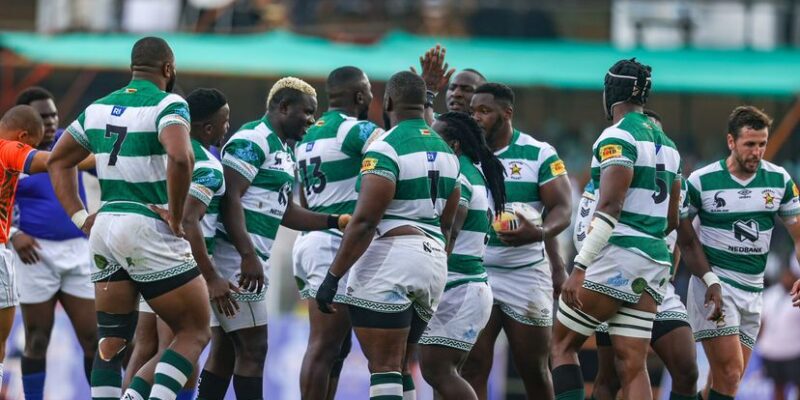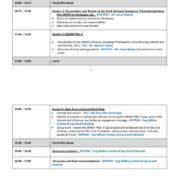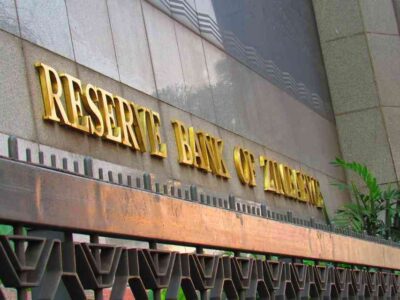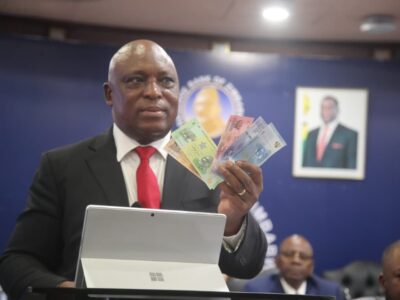By Ross Moyo
Zimbabwe will be in Australia at the September 2027 Rugby World Cup, after breaking the jinx that saw them play rugby world cup last time in 1991 almost 34 years ago.Despite Namibia drawing first blood and Zimbabwe leveling matters before break and later leading 30-21, the SABLES edged their neighbors who have not missed a world cup since their maiden 1999 appearance.Zimbabwe won a breathtaking nerve-wracking pulsating rugby world cup qualifier in Kampala, Uganda 30-28.
The Zimbabwean coaching stuff sighed relief celebrating SABLES QUALIFY FOR THE WORLD CUP.
In the Match Report: Rugby Africa Cup Final – Zimbabwe 30–28 Namibia
In one of the most pulsating finals in African rugby history, Zimbabwe’s Sables stormed into the 2027 Rugby World Cup with a dramatic 30–28 victory over long-standing rivals Namibia, ending a three-decade qualification drought and slaying a giant that had never before lost a World Cup qualifier on African soil.
Captain Hilton Mudariki who not only has broken a generation barrier, led Zimbabwe on a 13 match unbeaten run and booked a place for the Sables in 2027 said it’s for the people back home.
“This is for the over 15 million people back home and around the world.
“It is a lot to take in at the moment but I am very happy that we remained focused and treated each game like it was our last
“Tonight we celebrate being the trophy back home and never lose sight of a bigger calling ahead,” he said.
What unfolded at the Nelson Mandela National Stadium in Kampala was not merely a match—it was a contest worthy of the great war chronicles.
A test of sinew and spirit; of strategy and heart. On one side stood Namibia, Africa’s immovable fortress in World Cup qualifiers; and across them, Zimbabwe, armed with a full arsenal, no deserters in sight, and a hunger sharpened by 34 years of exile from rugby’s grandest stage.
Godfrey Muzanargwo was named the player of the match and in an emotional speech he gave thanks to the team as they won their 13th match unbeaten.
Ian Prior, a continental darling on the field was named the player of the tournament.
The arena, a cauldron of drumming thunder and swirling East African mist, became the setting for a modern-day trial by combat.
Namibia fired the first shot, striking through the boot within the opening five minutes to go 3–0 up.
But the Sables, undeterred, won their first scrum like a cavalry unit breaking rank and replied instantly—veteran Ian Prior levelling the field 3–3 with clinical precision.
It was immediately clear: both armies had studied each other’s battle maps. A second Namibian penalty restored their lead to 6–3, but Prior, cool under pressure, restored parity despite a miss moments earlier.
6–6 by the 12th minute, and the game had already become a war of attrition between two master tacticians in kicking boots.
Then came Zimbabwe’s first thunderous break. From a line-out executed with military timing and a flurry of crisp inside passes, vice-captain Kudzai “The Enforcer” Mashawi crashed over the whitewash like a battering ram breaching the enemy gates. Prior’s conversion made it 13–6.
Namibia clawed back with another penalty—13–9—but Zimbabwe pressed harder. A gutsy call to go for the corner instead of the posts tested the Namibian line, which barely held, but the pressure mounted.
Namibia’s discipline cracked, and a yellow card left them a man down. Prior, unflinching, made it 16–9.
Yet just as the Sables began to dig in, a yellow card to Jason Fraser returned the numbers to parity, and Namibia took swift advantage, slicing through for a try in the 35th to tie it 16–16.
The first half closed not with fatigue, but with a shiver.
Grey clouds loomed overhead, as though even the heavens were anxious to see who would be chosen..
The second half began with the kind of methodical brutality one only sees in campaigns of destiny.
Zimbabwe’s forwards surged with disciplined rage, grinding down the Namibian defence phase by bloody phase.
Their reward came—a try, a conversion, and the score tipped to 23–16.
The Ugandan crowd, whose red-gold-black mirrored Zimbabwe’s colours, were now emotionally annexed.
They roared as though it was their own sons charging toward history. The Sables’ diaspora—having travelled from Harare, Qatar, London and beyond—watched with clenched hands and eyes wide in prayer.
And then, in the 58th minute, the dam broke again. Brendan Mudzekenyedzi, gallant and sure-footed, galloped through a gap like a knight unsheathing his final strike. Try. Conversion. 30–16. The dream shimmered into sight.
But the Namibians, never ones to lie still, bit back almost instantly—30–21. It was now a clash of momentum. A game of inches.
With Mashawi replaced by debutant Bruce Houston—who slotted in seamlessly—the Sables held firm. Tapiwa Mafura, imperious under the high ball, countered with boot and bravery.
Namibia veered from their usual tactical play, stretching wide, throwing chaos at Zimbabwe’s shape, but the Sables bent without breaking.
Then, the unthinkable—Namibia crashed over in the 71st. 30–28. The final act was chaos, both sides heaving in pursuit of fate. The crowd celebrated every choke tackle like a liberation.
With three minutes left, Namibia attempted to usurp destiny from 50 metres. The penalty sailed wide. Heaven paused. And smiled.
As the clock drained and the cries of “Zimbabwe! Zimbabwe!” rose like a hymn of triumph, the whistle blew. Arms lifted. History rewritten.
Final Score: Zimbabwe🇿🇼 30 – Namibia🇳🇦 28.
Zimbabwe🇿🇼 are going to the Rugby World Cup.














Comments